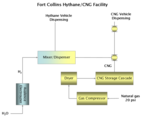Fort Collins Expanding Hythane (HCNG) Trials
26 August 2005
 |
| Fort Collins Hythane/CNG fueling facility. |
Fort Collins, Colorado, is moving ahead with the investigation of Hythane—a 15% by volume hydrogen, 85% CNG mixture—as a transportation fuel.
The project, which originated several years ago, began last year by switching one of the city’s 12-seater minibuses to the fuel. Fort Collins is now in the process of expanding that trial to another five minibuses.
As part of the trials, it is building a Hythane/CNG mixing and filling station that it will expand to offer pure hydrogen fueling as well. The facility uses electrolysis to produce the hydrogen, and further will purchase wind credits from its own wind power program to offset the filling station’s electricity needs.
Hythane is a patented mixture of hydrogen and CNG, created by Hydrogen Components, Inc. in Littleton, Colorado. Generically, such a mixture is called HCNG (Hydrogen-Compressed Natural Gas).
There are several advantages to using hythane or HCNG:
- First, the mixture can be used in standard OEM CNG vehicles. In the Fort Collins project, HCI is working with the city to do some minor tuning on the engines to optimize emissions reductions.
- It can leverage the existing CNG fueling infrastructure, and begin phasing in hydrogen.
- It produces significant reductions in emissions compared to pure CNG use with no impact on fuel efficiency or vehicle reliability.
Hythane reduces NOx emissions by 95% relative to diesel.
In tests between Hythane and CNG engines run by the Center for Transportation Technology and Systems, SunLine Transit Agency (which currently runs two Hythane buses) and Cummins Westport, the Hythane-fueled engines reduced NOx emissions by 50%, non-methane hydrocarbons by 58%, methane by 16%, total hydrocarbons by 23% and CO2 by 7% (approximately 10 million tons per year).
These reductions were achieved with no significant change in fuel efficiency between the Hythane- and CNG-fueled engines.
Hythane (or HCNG) is not a new concept. Indeed, Denver ran one of the pioneering studies of Hythane starting in 1991. The fuel now is experiencing a bit of a resurgence in interest as a means of improving the emissions profile of CNG and as a way of phasing in more use of and thus experience with hydrogen.
China, for one, has expressed extremely strong current interest in Hythane, going as far as to enter into a memorandum of understanding to convert 10,000 diesel buses in Beijing to run on the fuel prior to the start of the 2008 Olympics. (Earlier post.)
Resources:
- Hydrogen in Fort Collins, CO
- City and County of Denver: Technical comparison between hythane, CNG and gasoline fueled vehicles
- Advanced Vehicle Testing Activity: Low-Percentage Hydrogen/CNG Blend Ford F-150 Operating Summary - January 2003
- Next Generation Natural Gas Vehicle Activity: Natural Gas Engine and Vehicle Research & Development
To subscribe or visit go to: http://www.greencarcongress.com/